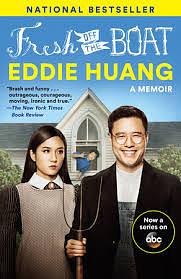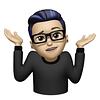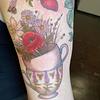Take a photo of a barcode or cover
"White people think it's unfair I give them a hard time for cooking OUR food or even having the audacity to say it's OUR food, but it's bullshit. You know what's really unfair? Not getting a job at the Orlando Sentinel 'cause of my FACE. Not getting the same opportunity it's for the same job for the same pay for the same work because of this FACE."
If you have no idea what the above quote is about or it makes you uncomfortable, this book will probably confuse you or piss you off. If the above makes sense to you, you'll probably find the book quite funny and touching.
If you have no idea what the above quote is about or it makes you uncomfortable, this book will probably confuse you or piss you off. If the above makes sense to you, you'll probably find the book quite funny and touching.
"My entire life, the single most interesting thing to me is race in America. How something so stupid as skin or eyes or stinky Chinese lunch has such an impact on a person’s identity, their mental state, and the possibility of their happiness. It was race. It was race. It was race."
I didn't know anything about Eddie Huang outside of the few episodes I've seen of Fresh of the Boat. We don't have much in common, but I learned a lot reading his memoir.
"To this day, I wake up at times, look in the mirror, and just stare, obsessed with the idea that the person I am in my head is something entirely different than what everyone else sees. That the way I look will prevent me from doing the things I want; that there really are Sneetches with stars and I’m not one of them. I touch my face, I feel my skin, I check my color every day, and I swear it all feels right. But then someone says something and that sense of security and identity is gone before I know it."
I didn't know anything about Eddie Huang outside of the few episodes I've seen of Fresh of the Boat. We don't have much in common, but I learned a lot reading his memoir.
"To this day, I wake up at times, look in the mirror, and just stare, obsessed with the idea that the person I am in my head is something entirely different than what everyone else sees. That the way I look will prevent me from doing the things I want; that there really are Sneetches with stars and I’m not one of them. I touch my face, I feel my skin, I check my color every day, and I swear it all feels right. But then someone says something and that sense of security and identity is gone before I know it."
unvarnished truth
Eddie strips it all away and shares his personal experience and unique perspective in a way that is true to the immigrant experience in America. Not for kids, but adults, open your minds and get a taste of what it is like to be fresh off the boat.
Eddie strips it all away and shares his personal experience and unique perspective in a way that is true to the immigrant experience in America. Not for kids, but adults, open your minds and get a taste of what it is like to be fresh off the boat.
Came to this off the ABC TV series and not BaoHaus/Huang’s World/basically any context in which I would’ve been exposed to Huang’s actual personality, so listening to 8 hours of his narration was An Experience. The audiobook has quite a bit more riffing than usual — notes on what he’s doing, why he wrote certain parts, sometimes just laughter — but it worked for me.
This was an entertaining, accessible coming-of-age story about race, migration and identity. It’s quickly evident why he has a bone to pick with the ABC version (which I think is excellent in its own right); Huang’s actual story is a lot more complex and sometimes just messed up, and it more deeply engages with the pressures of parental expectations and the “model minority” myth. I particularly liked how he wrote about his complicated love-hate relationship with his family (and especially his father). To be completely honest I find Huang’s braggadocio obnoxious and am not quite convinced that that one college prof really did open his eyes to feminism given how he otherwise writes about women, but it’s an important story brought to the world in an honest, frank voice.
This was an entertaining, accessible coming-of-age story about race, migration and identity. It’s quickly evident why he has a bone to pick with the ABC version (which I think is excellent in its own right); Huang’s actual story is a lot more complex and sometimes just messed up, and it more deeply engages with the pressures of parental expectations and the “model minority” myth. I particularly liked how he wrote about his complicated love-hate relationship with his family (and especially his father). To be completely honest I find Huang’s braggadocio obnoxious and am not quite convinced that that one college prof really did open his eyes to feminism given how he otherwise writes about women, but it’s an important story brought to the world in an honest, frank voice.
challenging
funny
fast-paced
I got this book as a Goodreads Giveaway!
I guess I'm getting old, but I couldn't understand half of what Mr. Huang was saying. I had no idea this memoir would be a love-letter about hip-hop/street culture. I enjoyed the few pages that actually talked about the food, and sadly that was all I enjoyed.
I guess I'm getting old, but I couldn't understand half of what Mr. Huang was saying. I had no idea this memoir would be a love-letter about hip-hop/street culture. I enjoyed the few pages that actually talked about the food, and sadly that was all I enjoyed.
weird w/ a lot of cursing, Eddie Huang had a ridic childhood, agree with some cultural views, what if I open a restaurant??
This is the best audio memoir I’ve ever listened to, Huang chatting at the listeners from minute one (“Yp, it’s ya boy, Eddie Huang!), breaking down laughing at the audacity of half of the anecdotes he got away with including, and stepping back to address the listener directly over and over. Exactly what an audiobook memoir should be: overflowing with personality (his speaking the Chinese sprinkled throughout only adds to this).
Very entertaining read about a son of Taiwanese immigrants trying to carve out an identity for himself in America. By the time I finished, I could talk hip-hop with the best of them. Now I want to eat at BauHaus next time I'm in NYC.
Not a story I could easily relate to, nor did I connect much with the constant references to hip-hop, basketball, sneakers, and New York street culture. His slang vernacular was off putting for me and felt over the top. I appreciate his struggle, though I can't personally relate to it. This book has a very specific audience that I am not a member of, but I did enjoy hearing a perspective very different from one I am used to hearing. I do want to eat at his restaurant though, and make some beef noodle soup, so it gets the extra star for that alone.



